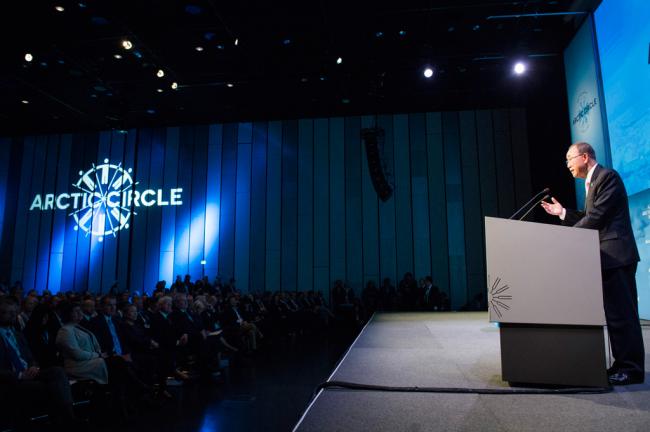
In Iceland, UN chief highlights that fate of Arctic and that of the world are intertwined
“The Arctic supports key pillars of the climate system regionally and globally. The fate of the Arctic is tied to the fate of Miami, Mumbai, Shanghai and coastal cities across the world -- and so much else of course,” said Ban in an address to the Arctic Circle Assembly in Iceland's capital, Reykjavik.
“When the Arctic suffers, the world feels the pain. And when the planet is under assault, the Arctic is likewise a casualty,” he added.
Noting that the Arctic region is “ground zero” for climate change, Ban pointed out that according to scientific research, it is warming more quickly than the rest of planet and that an increase in global temperatures by two degrees Celsius – the upper limit of what the Paris Agreement calls for – could mean a change of four and even five degrees in the Arctic.
He also highlighted with the ratification by 99 countries, representing 59 per cent of global emissions, the Paris Agreement would enter into force on 4 November and underscored the importance of its implementation.
“Few expected such swift action. I thank all of you for your contributions to this historic step. Political leaders, scientists, citizens in the street -- all played a role in grasping the gravity of the threat and mobilizing to set the world on a safer, more sensible path,” he said.
In his address, Ban also hailed the recent agreement by members of the International Civil Aviation Authority (ICAO) on a new global market-based measure to curb carbon dioxide emissions from international aviation and said that it is an important step by Governments, industry and civil society, building on the strong momentum provided by the Paris Agreement.
The Secretary-General further called for reducing short-lived climate pollutants, such as black carbon, which contributes to the rapid warming of snow and ice as well as appealed for more financial resources to help developing countries reduce their emissions and adapt to the inevitable consequences of climate change.
The UN chief also underlined the importance of indigenous peoples' traditional knowledge systems and said that their contributions will be essential to the achievement of the Sustainable Development Goals (SDGs) as well as in combatting climate change. He urged the Assembly to ensure that indigenous peoples, their rights and their sociocultural contributions, remain central as we address these shared challenges.
“We need governments to reach consensus next week in Kigali on a critically important amendment to the Montreal Protocol, which will phase down hydrofluorocarbons,” he said, adding: “This could help prevent up to half a degree of warming by the end of the century.”
30th Anniversary of the Reagan-Gorbachev Summit
Also on Saturday, Secretary-General Ban spoke at a seminar commemorating the 30th anniversary of the Summit between US President Ronald Reagan and Soviet General Secretary Mikhail Gorbachev, which despite of failing to achieve its goals, provided a path that ultimately led to the Intermediate Nuclear Forces Treaty (INF), eliminating all American and Soviet intermediate and shorter-range ground-based missiles.
“Thirty years later, Reykjavik's lessons have never been more relevant,” said Ban in his remarks. “As difficult as the international situation is on Saturday, current tensions fall well short of what President Reagan and General Secretary Gorbachev faced during the Cold War.”
Expressing concern at the resurgence of “Cold War ghosts,” the UN chief also noted that the world faces serious challenges in arms control and disarmament as well as non-state actors seeking to procure nuclear materials.
“So my message to world leaders on Saturday is clear: Let us summon the spirit of Reykjavik,” he said and emphasized: “Our common aspirations for peace, human rights and sustainable development require us to find a new paradigm for sustainable security without reliance on weapons of mass destruction.”
“And we need to put those ideas into action. In policies, in legislation, in treaties and in the real world.”
Meetings with the President and Prime Minister of Iceland
Further on Saturday, the UN chief held meetings on Saturday with Guðni Thorlacius Jóhannesson, President of Iceland, and with Sigurður Ingi Jóhannsson, the country's Prime Minister.
According to a readout issued by Ban's office, the Secretary-General congratulated Iceland for its ratification of the Paris Agreement and encouraged it to establish a mechanism to oversee the implementation of the Sustainable Development Goals.
The Secretary-General and the two leaders also agreed on the responsibility for UN Member States to implement the commitments made during the recent UN Summit for Refugees and Migrants, in particular the need to make addressing root causes of displacement a priority.
Also on Saturday, Secretary-General Ban held a joint press conference with Lilja Alfreðsdóttir, Minister of Foreign Affairs of Iceland.
UN Photo/Rick Bajornas
Source: www.justearthnews.com
Support Our Journalism
We cannot do without you.. your contribution supports unbiased journalism
IBNS is not driven by any ism- not wokeism, not racism, not skewed secularism, not hyper right-wing or left liberal ideals, nor by any hardline religious beliefs or hyper nationalism. We want to serve you good old objective news, as they are. We do not judge or preach. We let people decide for themselves. We only try to present factual and well-sourced news.







